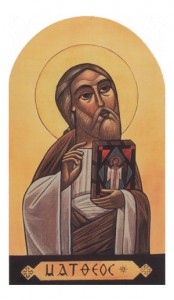Thoughts on the calling of the Holy Apostle and Evangelist Matthew
Matthew was a tax collector. When Jesus gave him the invitation to “follow me”, he responded with hospitality. He opened his house to the Lord, his disciples, fellow tax collectors, and unspecified sinners. Just to make sure everyone had a good time, this was all done within view of some local Pharisees. The Pharisees spent their whole lives dedicated to righteousness (as should all of us). I am perfectly willing to believe that they were sincere in their devotion to the Law. In fact, it was probably their devotion to the Law that led to their revulsion at seeing an alleged rabbi (Jesus) eating with sinners. They shared their righteous indignation with the Lord’s disciples and He overheard them. We can learn a lot about pastoral ministry by looking at Christ’s response.
First, He said (e.g. St. Mark 2:17);
Those who are well have no need of a physician, but those who are sick do.
I did not come to call the righteous, but sinners, to repentance.
This is the most obvious point: God was explaining what His mission to these sinners (and the world) was: He had come to bring them to repentance. This would hardly satisfy any ultra-Orthodox takfirists – they always want their pound of flesh! After all, repentance requires tears, and the best way to bring someone to tears is not to eat with them, but to beat them over the head with the Sin-Stick, right?! Evidently not, at least according to the all-knowing and all-loving God-man Jesus Christ. After acknowledging the sinfulness of His dinner companions and their need for repentance He corrected the Pharisees’ dubious pedagogical instincts with this (e.g. St. Matthew himself in 9:13);
Go and learn what it means, ‘I will have mercy, and not sacrifice’:
for I am not come to call the righteous, but sinners to repentance.
Christ is quoting Hosea when He says; “I will have mercy, and not sacrifice”. The full passage (which was implied) continues with (Hosea 6:6);
“… and [I desire] the knowledge of God more than burnt offerings.”
This is huge. The Pharisees knew the full quote and its context; they would have seen that Christ was telling them that they were guilty of the very same sorts of things that angered God throughout the Old Testament. He was telling them that they were more concerned with fulfilling the letter of the law (i.e. doing the “burnt offerings” well) than they were with knowing God or bringing others to Him. He was doing something that they should have been doing themselves.
How Christ Discipled His Sinners cum Apostles
More importantly, along with His entire response, Christ used this quote to describe His method for bringing the “knowledge of God” to sinners; He would use mercy to lead them to repentance, which would in turn allow them to grow in the knowledge of God.
St. John Chrysostom brings this point out at the end of his homily on this passage;
[Christ] is again establishing His argument by illustrations from common life [e.g. physician, old and new wine].
And what He says is basically this, “The disciples have not yet become strong; they still need a lot of condescension.
They have not been renewed by the Spirit yet. You really shouldn’t put a lot of injunctions on people who are still weak.”
And He said all these things in order to set laws and rules for His own disciples,
so that when it was their turn to train disciples, they would deal with them very gently.
To reiterate St. John’s point, God is showing His disciples how the Gospel is to be taught: gently and with mercy … while protecting the weak from the attacks of the self-righteous. This is important for us as Christian leaders: we are called to follow Christ! We are called to take His Gospel to sinners so that they might repent, come to the knowledge of God, and be saved. Keep the Sin-Stick ready, but use it the way Christ Himself did; to defend the weak from the attacks of the self-righteous.
There is a temptation to bring sinners to a full awareness of their sin in order to drive them towards repentance, but be careful with this. Repentance, kenosis, and discernment are fostered over time. It is an iterated and communal process. The wounds this world inflicts on God’s children are serious and it takes time for Him to heal them. This means that you may not be able to see the process through to its conclusion, but it is okay to simply begin the treatment; the Church has trained other physicians that can continue the process, just as you will be called to continue the work others have begun.
Epilogue: get out of bed!
There is some legitimate concern that this slower, gentler process might never lead to true repentance and wisdom. The physician truly came to heal those who are sick and the church is His hospital. But Christians are not just called to be healed, they are called to bring healing to others. To be honest, we have less of a problem in our parishes of getting people into the bed for healing; the problem is that they tend to stay there. Like Homer Simpson in the nursing home, we have too many self-indulgent and lazy malingerers that never get out of their sick beds to minister to others (as they are called to do). As a result, our parishes are staffed by over-worked (or burnt out) physicians who serve people who are well enough to help but prefer to be pampered. Is it any wonder that our parishes stagnate and decline when they should – and could! – be growing? Yes, many of our parishes are in troubled areas. “Our people” have moved away in search of better opportunities. But what that really means is that our parishes have plenty of empty beds to treat the unchurched sinners who moved into the area to take their place. And, if we follow Christ’s example, those sinners will eventual join us in service and evangelization and our parishes will thrive.
Saint Matthew’s life is a testimony to the efficacy of this gentle discipleship process. He was a sinner. The Lord protected Him and showed Him mercy. Over time, through His example, His holiness, and His teachings, He brought Matthew through repentance to the true knowledge of God. As a recipient of this grace, St. Matthew could do nothing else but offer it to others. He did not stay in the hospital bed (nor would Christ have allowed Him to!), but ended up as a martyr in Ethiopia after a life spent spreading the Gospel.
May the Lord send His Church patient, merciful, and holy pastors who can do the same.



I truly enjoyed reading this. It served to boost my confidence that I SHOULD be talking to people I encounter about our faith and church. Thank you Father!